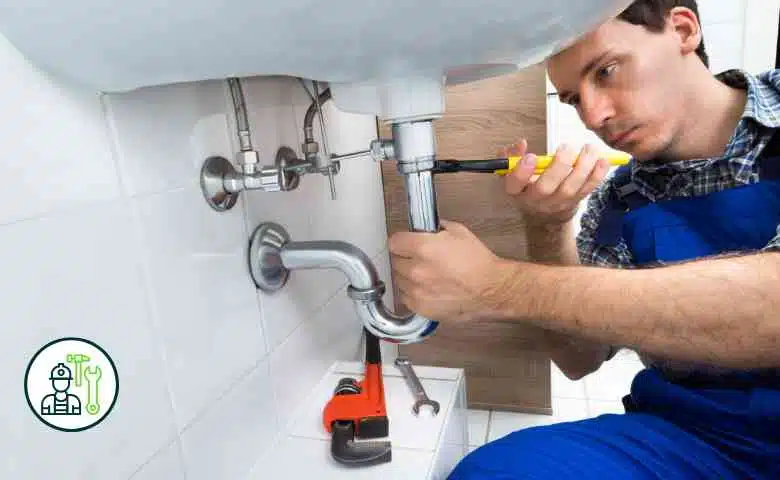Last Updated on March 11, 2025 by Admin
Sustainability in construction has become a key focus as the world seeks to reduce its carbon footprint and create more eco-friendly, energy-efficient buildings. One crucial player in this effort is the skilled plumber. While plumbing is often seen as a basic necessity in construction, plumbers’ expertise goes far beyond just installing pipes. They play an essential role in implementing sustainable practices that help conserve water, reduce energy consumption, and ensure the longevity of buildings.
ConstructionCareerHub App is LIVE — built ONLY for construction careers. Don’t apply with a weak resume.
Get ATS-ready Resume Lab + Interview Copilot + Campus Placement Prep (resume screening, skill gaps, interview readiness) — in minutes & Other advanced features.
Explore Smarter Construction Career Tools →Quick check. Big impact. Start now.
1. Water Conservation
Water usage is one of the most significant environmental concerns in construction and homeownership. Skilled plumbers are at the forefront of ensuring that construction projects are equipped with water-efficient systems. This involves installing water-saving fixtures, effective irrigation systems, and rainwater collection systems. Plumbers contribute to reducing water waste by fitting efficient toilets, faucets, and showerheads. For instance, contemporary low-flow toilets consume much less water per flush, helping to lower total water usage. Moreover, plumbing specialists can create and install greywater systems that recycle water from baths, sinks, and washing machines for use in irrigation or flushing toilets, thus enhancing water conservation.
2. Energy Efficiency
Another way skilled plumbers contribute to sustainability is by installing energy-efficient plumbing systems. The plumbing system in a building directly impacts its energy efficiency, particularly in areas such as water heating and heating systems. Plumbers can install energy-efficient water heaters, like tankless or solar-powered models, which lower energy use by delivering hot water only when required and utilizing renewable energy sources. Moreover, plumbers are integral in installing and maintaining radiant heating systems, which provide even and efficient heating by using pipes filled with warm water to circulate heat throughout the building. Proper insulation of water pipes is another crucial task for plumbers, as uninsulated pipes can lead to heat loss, increasing the energy required for water heating. By ensuring all pipes are adequately insulated, plumbers help reduce the energy required to maintain hot water temperatures.
3. Use of Sustainable Materials
Plumbers are also responsible for selecting and using sustainable materials in their installations. The rise of eco-friendly materials in construction, such as recycled pipes and low-impact fittings, has opened up new opportunities for plumbers to contribute to sustainable practices. For instance, copper, although a durable and long-lasting material, has a high environmental cost in terms of mining and processing. Plumbers now have the option of using alternatives like cross-linked polyethylene (PEX) pipes, which are more sustainable due to their lower production costs and longer lifespan. By choosing the right materials, plumbers help reduce the environmental impact of the plumbing system throughout the building’s life cycle. Sustainable materials also reduce the risk of harmful substances entering water supplies, ensuring cleaner, safer drinking water for occupants.
4. Working together on Green Building Certifications
Plumbers play a crucial role in achieving certifications like LEED (Leadership in Energy and Environmental Design). These certifications are awarded to buildings that meet specific environmental criteria, and plumbing systems are an integral part of the process. A plumber’s knowledge of sustainable plumbing solutions, from water conservation techniques to energy-efficient systems, is critical for meeting the stringent requirements of these green certifications. By working closely with architects and contractors, skilled plumbers can ensure that the plumbing system aligns with green building goals and contributes to the building’s overall sustainability rating.
5. Maintenance and Longevity
Plumbing systems that are well-maintained not only perform better but also contribute to the sustainability of the building. Regular maintenance of plumbing systems can prevent issues like leaks, which waste water and increase energy usage. A skilled plumber can identify potential problems early on and provide solutions that reduce the need for repairs and replacements. Regular maintenance also helps prolong the life of plumbing systems, reducing the need for new materials over time. By opting for repairs instead of replacements, plumbers minimize the waste produced during construction and renovation projects.
Conclusion
Skilled plumbers are vital to the success of sustainable construction practices. From water conservation and energy efficiency to using eco-friendly materials and ensuring the longevity of plumbing systems, they play an integral role in making buildings more environmentally responsible. As sustainability becomes increasingly important in the construction sector, plumbers will continue to play a vital role in creating environmentally-friendly, energy-efficient, and water-saving buildings. Their expertise helps to create buildings that not only serve their occupants but also protect and preserve the environment for future generations.
Related Posts:
- Plumbing Careers: Opportunities and Pathways in Plumbing
- Do plumbers have to be licensed?
- Essential Tools for Plumbers: A Complete Guide
- Draining Disasters No More: A Complete Guide to Hiring a Reliable and Professional Plumber
- 10 Tools to Resolve the Plumbing Problems


